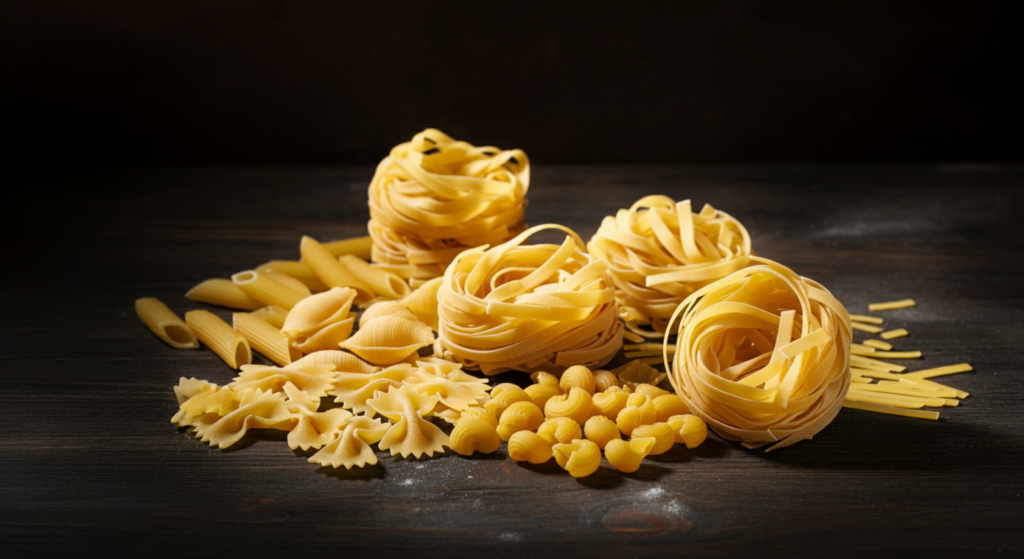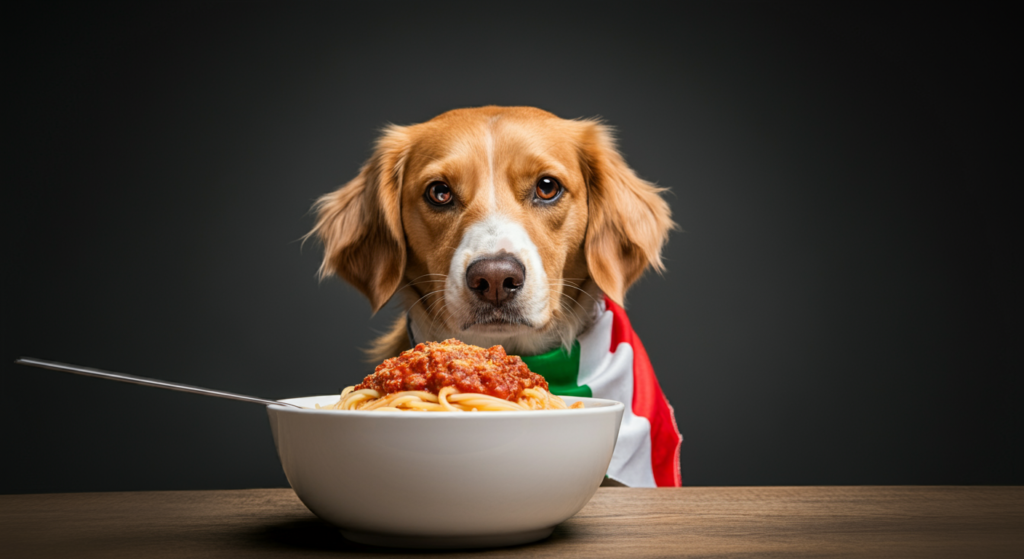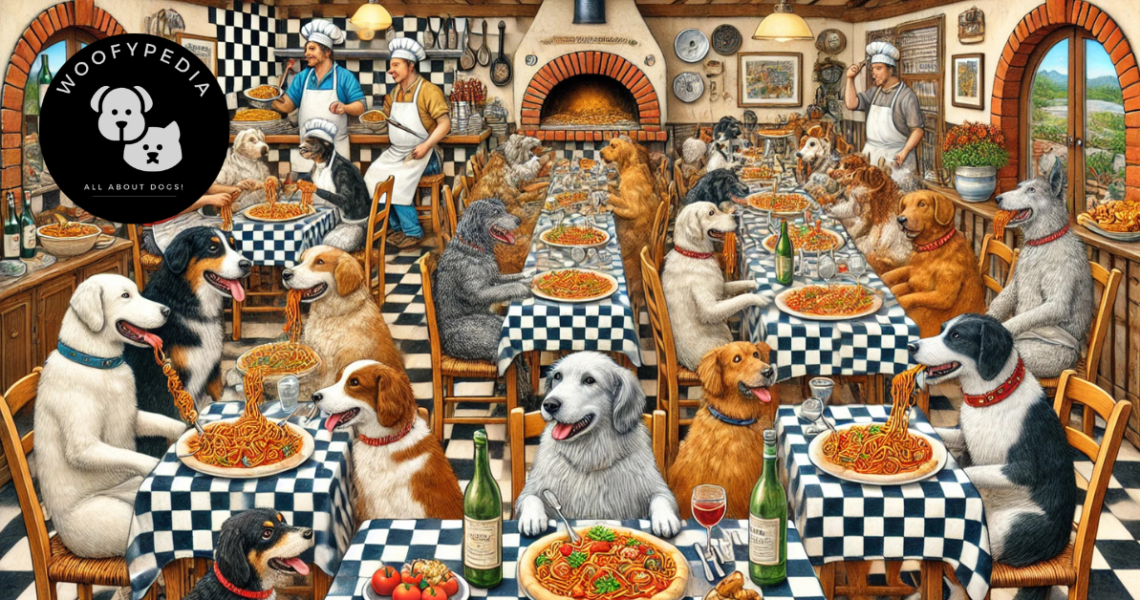Can dogs eat Pasta?
Table of Contents
- Pasta and Paws: Comfort Food or Cause for Concern?
- What Is Pasta?
- Can Dogs Eat Pasta?
- What Are the Benefits of Pasta for Dogs?
- Are There Risks to Feeding Pasta to Dogs?
- How to Safely Serve Pasta to Dogs
- Fun Facts About Dogs and Pasta
- Conclusion
- FAQ: Pasta and Dogs
- 1. Is cooked pasta okay for dogs?
- 2. How much pasta is okay for dogs?
- 3. Can dogs eat pasta in the UK?
- 4. Is it okay if my dog ate pasta?
- 5. Can dogs eat pasta sauce?
- 6. Can you feed dogs pasta instead of rice?
- 7. Can dogs eat pasta and cheese?
- 8. Can dogs eat pasta for an upset stomach?
- 9. Can dogs eat pasta noodles?
- 10. Can dogs eat pasta every day?
- 11. Can dogs eat rice?
- 12. Can dogs eat pasta with butter?
Pasta and Paws: Comfort Food or Cause for Concern?
Let’s be honest—pasta is the ultimate comfort food, right? Whether it’s spaghetti, penne, or good old macaroni, it’s a staple in so many of our favourite meals. But as dog owners, it’s natural to wonder if our furry friends can join us at the dinner table. You might be asking yourself, “Can dogs eat pasta?” It’s filling, it’s versatile, and it’s oh-so-tasty for humans, but is it safe for dogs? Let’s dive into the facts so you can decide whether to share a bite with your pup or keep the pasta bowl to yourself!
Yes, dogs can eat pasta, but only under specific conditions. When served plain, fully cooked, and in moderation, pasta is generally safe for dogs and may even be an occasional treat. However, factors like sauces, seasoning, and portion size play a critical role in determining whether pasta is appropriate for your pet. Let’s explore the details to ensure your dog’s health and happiness.
What Is Pasta?
Pasta is a type of dough made primarily from wheat flour and water, often with the addition of eggs. It comes in various shapes and sizes, from spaghetti and penne to farfalle and ravioli. While pasta is a rich source of carbohydrates, it lacks the protein, vitamins, and minerals essential to a dog’s diet.
In human cuisine, pasta is usually prepared with sauces, cheese, or seasoning to enhance flavour. These additions, however, often contain ingredients that are harmful to dogs, such as garlic, onions, and excessive salt. Understanding what’s in your pasta is essential before sharing it with your furry friend.

Can Dogs Eat Pasta?
The simple answer is yes, dogs can eat pasta, but only in moderation and under specific conditions. Plain, cooked pasta without any additives can be a safe occasional snack. However, pasta should not be a staple of your dog’s diet due to its low nutritional value compared to dog-specific foods.
Can Dogs Eat Whole Wheat Pasta?
Yes, whole wheat pasta is also safe for dogs, provided it’s plain and cooked. Whole wheat pasta contains more fibre than regular pasta, which can be beneficial for digestion. However, some dogs may have sensitivities to wheat, so always monitor for any adverse reactions.
Can Dogs Eat Gluten-Free Pasta?
Gluten-free pasta made from rice, quinoa, or lentils is generally safe for dogs as well. As with any food, ensure it’s cooked and free of harmful additives.
What Are the Benefits of Pasta for Dogs?
While pasta isn’t an essential food for dogs, it can provide some temporary benefits when prepared correctly. Here are a few potential advantages:
- Energy Source
Pasta is rich in carbohydrates, which can provide a quick energy boost for active dogs. However, too many carbs can lead to weight gain, so moderation is key. - Easily Digestible
Plain, cooked pasta is easy on most dogs’ stomachs, making it a suitable option for pets recovering from illness or needing a bland diet. - Fibre in Whole Wheat Pasta
Whole wheat pasta contains dietary fibre, which can support healthy digestion and regular bowel movements. - Low Allergen Risk (in Moderation)
Pasta made with simple ingredients is unlikely to trigger allergies in most dogs, making it a safer option compared to heavily processed treats.
Are There Risks to Feeding Pasta to Dogs?
Yes, pasta comes with potential risks, especially if it’s not served correctly or is consumed in large amounts. Here are some dangers to be aware of:
- High Calorie Content
Pasta is calorie-dense and can contribute to weight gain if fed frequently or in large portions. Obesity in dogs can lead to health problems such as joint pain, diabetes, and heart disease. - Allergies or Sensitivities
Some dogs may be sensitive to wheat or gluten, leading to symptoms such as itching, digestive upset, or skin issues. - Sauces and Seasonings
Most pasta dishes include ingredients like garlic, onion, or salt, which are toxic to dogs. Even creamy sauces can upset a dog’s stomach due to high fat content. - Digestive Upset
Eating too much pasta can lead to diarrhoea, vomiting, or gas. Dogs not accustomed to carbohydrate-rich foods may struggle to digest pasta properly. - Nutritional Imbalance
Pasta lacks essential nutrients that dogs need, such as protein, vitamins, and minerals. Over-reliance on pasta can lead to malnutrition over time.
How to Safely Serve Pasta to Dogs
If you decide to share pasta with your dog, follow these guidelines to ensure their safety:
- Cook It Plain: Boil pasta without salt, oil, or seasoning. Serve it plain and cooled.
- Avoid Sauces: Steer clear of marinara, Alfredo, or any sauce containing garlic, onions, or spices.
- Control Portions: A small serving, such as a few pieces of pasta, is sufficient. Avoid feeding large amounts.
- Check for Allergies: Introduce pasta slowly and monitor for any adverse reactions, such as itching or digestive issues.
- Avoid Raw Pasta: Uncooked pasta can expand in the stomach, causing discomfort or blockage.
Fun Facts About Dogs and Pasta
- Dogs in Italy might encounter pasta as part of their owners’ meals, but it’s typically plain and served sparingly.
- Some dogs love the texture of cooked pasta and find it fun to chew on shapes like penne or fusilli.
- While pasta has been around for centuries, dogs’ dietary needs haven’t changed—they thrive best on balanced, species-appropriate meals.
Conclusion
So, can dogs eat pasta? Yes—with precautions. Always serve plain, fully cooked pasta in small amounts and avoid any harmful sauces or seasonings. While pasta can be a fun occasional treat, it should never replace nutritionally complete dog food. If you have concerns about introducing pasta to your dog’s diet, consult your veterinarian. Have you tried giving your dog pasta? Share your experience below!

FAQ: Pasta and Dogs
1. Is cooked pasta okay for dogs?
Yes, plain cooked pasta is generally safe for dogs. It should be served without any sauces, seasonings, or additives. Always ensure the pasta is fully cooked and cooled before offering it to your dog.
2. How much pasta is okay for dogs?
Pasta should only be given as an occasional treat. Small dogs can have 1–2 tablespoons of pasta, while larger dogs can enjoy up to half a cup. Avoid overfeeding, as pasta is high in carbohydrates and can lead to weight gain.
3. Can dogs eat pasta in the UK?
Yes, dogs in the UK can safely eat plain pasta, following the same guidelines: it should be cooked, plain, and served in moderation.
4. Is it okay if my dog ate pasta?
If your dog ate plain pasta, it’s generally not a cause for concern. However, if the pasta contained sauce, butter, garlic, or other harmful ingredients, monitor your dog for signs of an upset stomach or toxicity and consult your vet if necessary.
5. Can dogs eat pasta sauce?
No, pasta sauce is not safe for dogs. Most sauces contain ingredients like garlic, onion, or added salt, which are harmful to dogs. Stick to plain pasta without any toppings.
6. Can you feed dogs pasta instead of rice?
While pasta can occasionally replace rice, it’s not as nutritious. Rice, especially plain white or brown rice, is easier to digest and a better option for dogs with upset stomachs.
7. Can dogs eat pasta and cheese?
It’s best to avoid giving dogs pasta with cheese. Many dogs are lactose intolerant, and cheese can lead to digestive issues like gas, diarrhoea, or vomiting. Stick to plain pasta.
8. Can dogs eat pasta for an upset stomach?
Pasta is not recommended for soothing an upset stomach. Plain white rice is a better alternative, as it’s easier to digest and less likely to cause further irritation.
9. Can dogs eat pasta noodles?
Yes, plain pasta noodles are safe for dogs in moderation. Avoid any added salt, oil, or sauces, and cut the noodles into smaller pieces for easier consumption, especially for small dogs.
10. Can dogs eat pasta every day?
No, pasta should not be a daily food for dogs. It’s high in carbohydrates and lacks essential nutrients dogs need. Use pasta as an occasional treat, not a regular part of their diet.
11. Can dogs eat rice?
Yes, rice is safe and often recommended for dogs. Plain, cooked white or brown rice is easy to digest and can be beneficial for dogs with upset stomachs.
12. Can dogs eat pasta with butter?
No, pasta with butter is not recommended for dogs. Butter is high in fat and can upset a dog’s stomach or contribute to weight gain. Stick to plain pasta without any toppings.
